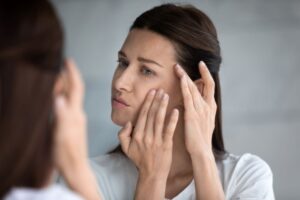
In their quest to remain youthful, many people do things like exercise, eat a balanced diet, use luxurious skincare products, and more. Sadly, those, some of those individuals do not care for one aspect of their health that can have a big impact on how quickly they age — their sleep. Research suggests that sleep disordered breathing (SDB), such as what occurs in people with sleep apnea, can speed up the aging process. This blog post discusses important points from that research and touches on some signs that you should seek treatment for sleep apnea.
Disordered Breathing and Biological Age
Traditionally, age is measured according to the number of years that have passed since a person’s birth. That is known as chronological age. However, there is another type of age that is even more relevant to health: biological age, which is basically a measurement of how old your body seems based on an analysis of how your genes are functioning.
A study published in 2019 gathered data from more than 600 participants. It determined that SDB can speed up the biological aging process. Although this problem was more noticeable in women than in men, both sexes showed signs of increased aging. The more severe the disordered breathing, the greater the impact on biological age.
The lead author of the 2019 study mentioned above, Dr. Xiaoyu Li, noted, “Our data highlight the potential for sleep-disordered breathing treatment to improve age-related chronic conditions and longevity.” In other words, improving the quality of your sleep might slow down or even slightly reverse your biological age.
How Well Are You Sleeping?
How can you tell if you should seek treatment for nighttime breathing problems? Here are some signs that you might have obstructive sleep apnea (OSA), which is one of the most common causes of SDB:
- You snore loudly and frequently.
- Your partner has told you that you sometimes stop breathing at night.
- You frequently wake up with a sore throat or headache.
- You sometimes wake up gasping for air.
- You always feel exhausted despite sleeping for 8 hours or longer.
- You often experience moodiness and irritability.
- You make frequent nighttime trips to the bathroom.
Turn Back the Clock with Sleep Apnea Treatment
If you are diagnosed with OSA, you may have a few different treatment options. Many patients use a CPAP machine or an oral appliance from their dentist to manage their symptoms. These methods are effective, but they do not address the root cause of OSA. Other treatment options, such as VIVOS, which gently alters oral anatomy to allow for better breathing, may provide truly long-term results.
Sleep apnea could make you feel older than you really are! Monitor the quality of your sleep so you can take steps to stay as young and healthy as possible.
Meet the Practice
Dr. Russell Teasdale is a highly experienced dentist who focuses his practice on helping patients find freedom from sleep apnea and TMJ disorder. He offers the advanced VIVOS system and state-of-the-art laser therapy to help patients breathe better at night. To learn more about how he and our team may be able to serve you, contact Evolution Dental in Portland at 503-974-3829.
